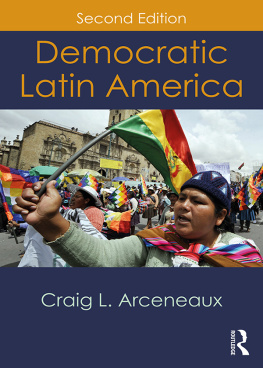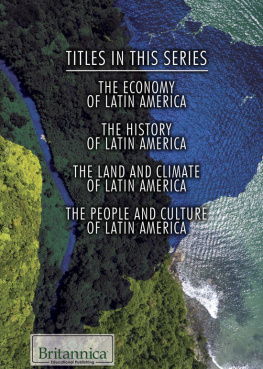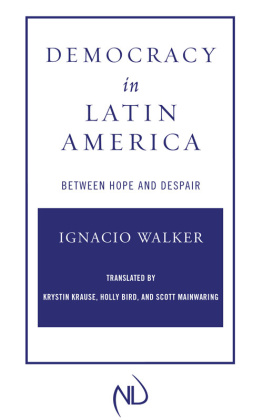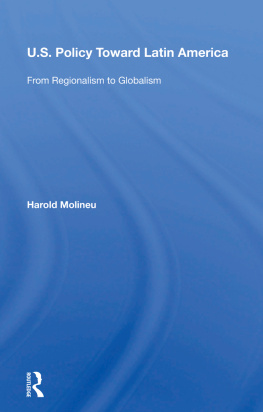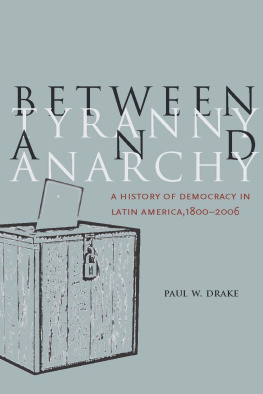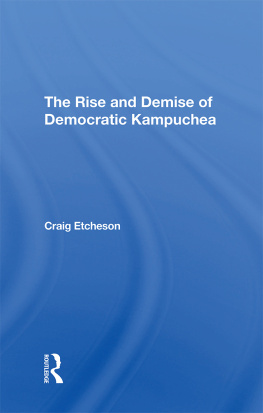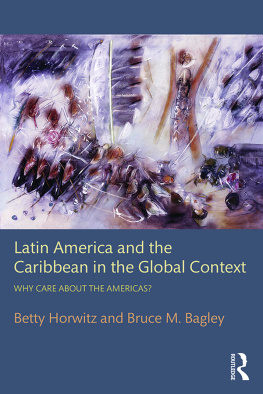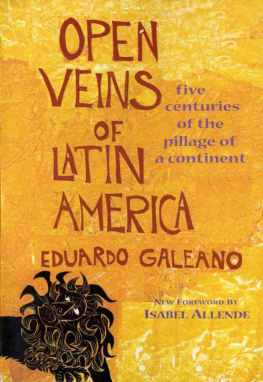Democratic Latin America
This much-expanded and updated second edition of Democratic Latin America takes an institutional approach to Latin American politics to discuss contemporary politics and to highlight how past politics have shaped current institutional designs. It draws explicit connections between certain political featuressuch as fragmentation, efficiency, accountability, instability, consensus, or responsivenessand the institutional design of a country. Students thus learn not only that a country is unstable or has high rates of participation or low levels of corruption, but they also learn why. And more importantly, they also learn how politics can be shaped by different institutional arrangements.
Features:
- Each chapter focuses on a different institution, such as the executive, political parties, electoral systems, the armed forces, or federalism and compares how they are constructed differently across countries.
- Placing a premium on accessibility, each chapter opens with a story and ends with a detailed country case study, making use of contemporary examples to feed student interest in current events.
- Newly updated comparison-based tables and box features (electoral results, percentage of women legislators, and surveys of partisan identification) are included to stimulate analysis.
- New topics of research have been added to ensure the recognition of the latest changes in the region, including: corruption scandals; the turn of the pink tide; protest and social movements; LGBT rights; citizen security and organized crime; new forms of legislative accountability; and the use of social media as a political resource in Latin America.
Democratic Latin America continues to offer an original way of teaching and learning about Latin American politics.
Craig L. Arceneaux is Professor of Political Science at California Polytechnic State University, San Luis Obispo. He served as Chair of the Political Science Department from 20092013.
Democratic Latin America
Second Edition
Craig L. Arceneaux
Second edition published 2018
by Routledge
711 Third Avenue, New York, NY 10017
and by Routledge
2 Park Square, Milton Park, Abingdon, Oxon, OX14 4RN
Routledge is an imprint of the Taylor & Francis Group, an informa business
2018 Taylor & Francis
The right of Craig L. Arceneaux to be identified as author of this work has been asserted by him in accordance with sections 77 and 78 of the Copyright, Designs and Patents Act 1988.
All rights reserved. No part of this book may be reprinted or reproduced or utilised in any form or by any electronic, mechanical, or other means, now known or hereafter invented, including photocopying and recording, or in any information storage or retrieval system, without permission in writing from the publishers.
Trademark notice: Product or corporate names may be trademarks or registered trademarks, and are used only for identification and explanation without intent to infringe.
First edition published 2012 by Pearson Education, Inc.
Library of Congress Cataloging-in-Publication Data
Names: Arceneaux, Craig L., 1965- author.
Title: Democratic Latin America / Craig L. Arceneaux.
Description: New York, NY : Routledge, 2017. | Includes bibliographical references and index.
Identifiers: LCCN 2017011195 (print) | LCCN 2017012148 (ebook) | ISBN 9781315544991 (Master) | ISBN 9781134824694 (WebPDF) | ISBN 9781134824762 (ePub) | ISBN 9781134824830 (Mobipocket/Kindle) | ISBN 9781138682665 (hardback : alk. paper) | ISBN 9781138682672 (pbk. : alk. paper)
Subjects: LCSH: DemocracyLatin America. | Latin AmericaPolitics and government.
Classification: LCC JL966 (ebook) | LCC JL966 .A74 2017 (print) | DDC 320.98dc23
LC record available at https://lccn.loc.gov/2017011195
ISBN: 978-1-138-68266-5 (hbk)
ISBN: 978-1-138-68267-2 (pbk)
ISBN: 978-1-315-54499-1 (ebk)
Typeset in TimesNewRomanMTStd
by diacriTech, Chennai
Contents
At my university, I have had the privilege to accompany my students on several study abroad programs. Not too long ago, I traveled with a group of students to Cusco, Peru. As those familiar with Latin America well know, protest activity is common throughout the region, but things were particularly turbulent on our trip. A wide range of groups had latched on to a labor protest by a teachers union to voice their grievances in a series of marches and work stoppages. Students had difficulty getting to classes, roadblocks threatened our weekend excursions, and the prospects for violence were very real. The reaction from my students was the same I had seen from other student groups and even in companions with whom I have traveled in the past. They commented on the passion they saw in Peruvian politics and compared it to the apathy they more typically observed in the United States. For the students, the protests were an exciting, even commendable thing.
I could hardly disagree with these impressions. When people sense injustice, they have every right to respond. And yes, all too often we do not see this spirited behavior in the United States. But it was not that the reactions of my students were incorrect, it was that they were incomplete. I pressed my students to think more deeply about just why Peruvians had decided to take to the streets. What prompted the sense of injustice in the first place? How did Peruvians come to decide that protest was their only option? And how was it that a narrow protest by teachers transformed into a clamor over inflation, unemployment, indigenous rights in the Amazon, workers conditionseven a call for a new constitution.
With a little prodding, the students soon linked the protest activity to certain features of government, such as responsiveness, accountability, representation, and efficiency. A healthy democracy exhibitsand fiercely defendsprotest activity. Likewise, a healthy democracy recognizes conflict as an inherent property of politics. But when activism becomes almost routine, such that it rather than government appears to be the central forum for popular expression, this tells us that something is wrong, that government institutions are failing to do their job. It is one thing to celebrate the political passion we see as groups take to the streets, but the larger question is how government can uphold its commitment as a representative of the people. I advised my students that the answer rests within government institutions. Much like a bridge or a building, there are different ways to construct government institutions and to make improvements so that they are geared toward responsiveness, efficiency, and other valued objectives. The struggle for democracy, then, really is all about institutions.
Democratic Latin America seeks to provide that insight. It covers much of the same history, topics, issues, and concepts found in most introductory texts on Latin America, but it does so from the angle of institutions. It therefore not only provides a fresh look at the region, but also does so from a perspective that appropriately represents the prevailing approach in the field of comparative politics.
Other core texts on Latin America tend to leave out or give only brief attention to political institutions. There is a false impression that Latin American political institutionsspecifically presidentialismare little more than a replay of U.S. political institutions and that therefore there is no need to discuss what is already familiar to most people. This is, of course, patently wrong. As I document, political institutions in Latin America are distinct. Presidentialism blends with elements of parliamentarism, both bicameral and unicameral legislatures operate in the region, most countries do not use federalism, the proportional-based electoral systems produce numerous and disparate parties, and the court systems work according to code law rather than common law.


